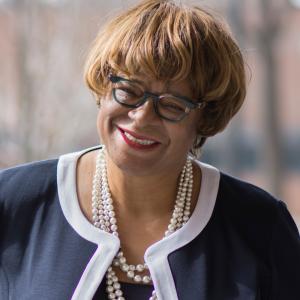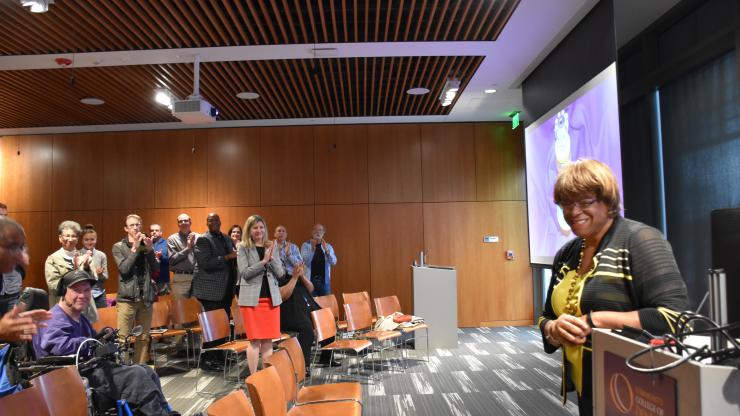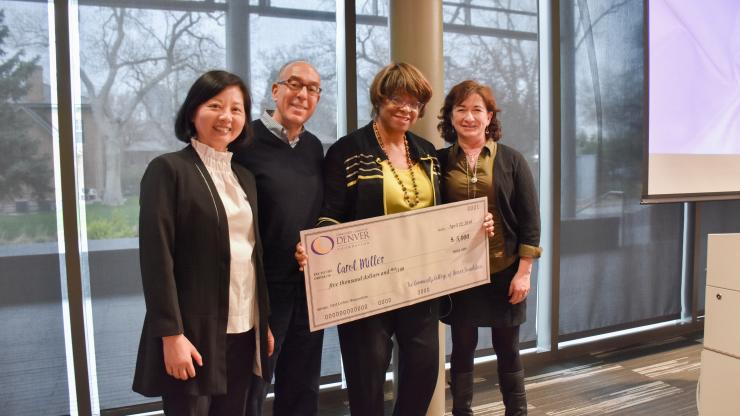

CCD Auraria Campus is operating remotely for employees and students as of 5pm, April 29, through May 5. Learn more.


During her Last Lecture Series on April 22nd, Carol presented "Making a Difference."
At the special event, Dr. Miller discussed what she ardently believes ought to matter most — making a difference — whether it be in life, as an educator or in society. Drawing from a life of scholarship and inclusion, and her 32 years of teaching for Community College of Denver, Carol’s final lecture is clearly intended to teach and reflect on her time as an educator, and her hopes for the future of the college.
In honor of her years of service, the CCD Foundation presented Dr. Miller with a $5,000 check.
by Carol Miller, Ph.D.
Professor of Business, Marketing & Management
Thank you, Dr. Freeman for your introduction. And thank you all for welcoming me to this unique stage. What an incredible opportunity for me to give one final lecture to the place I have called home for more than 30 years.
I’d like to share with you a reflection of my life and career and the highlights that stick out in my mind as momentous occasions, however small they may have seemed at the time. And to offer a few of my hopes for you and CCD as a whole.
I joined Community College of Denver in September of 1987 and discovered its reach by working in several non-academic areas. Eventually, in the fall of 1998, I taught my first class, but before I ever set foot in a classroom, I knew I wanted to be a teacher and that I would be happy teaching for the rest of my career. You see, I came for a long line of educators. All my sisters were teachers. My aunts were teachers. I am descended from people who liked to share what they knew and talked in a way that made people want to listen.
My father and his mother, my grandmother, would talk for hours at the kitchen table and I loved to listen to them; just listen. I was not in their league when I was young and could not grasp the meaning or truly appreciate the wisdom behind their conversations at the time, but I wanted to join the conversations that covered topics about everything and anything. By my early 30s, I took the place of my grandmother and joined my father at the table. My father was eloquent, he was a gentleman and he was funny. He was well-loved and well-respected by our community.
One of my most memorable memories was the day Barack Obama won the presidency. Once my sons and I stopped crying, screaming and hugging, the first person I wanted to call was my father; we talked for three hours that night. I was moved to hear an 80-year-old black man reflect on something he never thought he’d see in his lifetime, and I imagined the stories he could tell about the struggle it took to get to this joyous event.
My dad was a genuine person. Everybody loved him. He spoke in a way that made people want to listen. My father inspired me, as did my mother. My mother was an incredible force. Although my father had the education and imparted wisdom, it was my mother who could move mountains. She paved the way for six children to attend college and excel in their chosen professions. She took care of my siblings and me and our house while working a full-time job. She challenged the status quo and would fight against and question any wrong or injustice — a dirty grocery store in a black neighborhood, a teacher who grabbed my sister’s arm at a time when teachers could do that. She worked for the federal government and filed several grievances that had merit, but due to the times, nothing resolved our issues. But, I admired that she stood up for her rights, and it is because of her that I too have this fire burning within me to right the wrongs. She inspired me then and still does.
About two years ago, in an ‘ah-ha’ moment, I figured out that I was a unique blend of the two of my parents. That was important to me because until that point I had not thought of that as my reality. It has guided me throughout my life without me even realizing it.
Likely, the most pivotal time of my life was at the University of Denver. During this time
This was a change I needed because high school came very easy to me. I am not sure I ever needed to study for a test in high school, which really did not prepare me well for college. In college, I had to study, really study. I had to learn how to take notes. (I am not sure I even had a notebook in high school.)
This all matters because I learned how to study due to the guidance of one teacher during my first year who told us what to write down and when to write it down. In other courses, I remember looking around at the class and saying to myself, “Oh gosh when they write I should be writing.” I learned how to compete. I learned I could compete!
Facilitating training for the Anti-Defamation League (ADL) was a huge milestone for me because it was the first chance I had to lead in a small-group setting. I liked that I received guidance on how to train others and that there was specific emphasis on content. I was reading quite a bit on diversity and workplace issues and our focus was youth of all ages. I learned we should always start with self-perception and how that influences our understanding of diversity. I began facilitating diversity workshops with the ADL more than 23 years ago.
Back then, it was about diversity, not inclusion. Quote: “Tolerance and a melting pot.” This was important because this is when I realized my passion for the topic.
My biggest revelation during this time was how much I loved teaching. The ADL prepared me well for my life as a teacher. It also made me aware of how one small change could lead to another.
When I first started teaching, I had to write down everything I was going to say, even the jokes. In my actual notes, I’d write, “tell a joke here.” Those jokes were the times I could bring more of my personality into the lecture.
I developed a method for my teaching. I read the material and my lecture consisted of telling students what I read in a way that made sense to them. I remember a student once told me, “You are so good I do not need to read the book.” Even though he meant it to be a compliment, I realized I had taken on my students’ learning as my sole responsibility instead of making it a shared learning experience. What I was doing was putting the responsibility for learning on me.
I started to think about how I could focus my teaching style differently. There I went, not leaving well enough alone; I have a knack for that. I wanted to figure out how learning could not be about teaching but truly be about student learning. If I wanted my students to be responsible for their own learning, then what would be my role?
I wanted to focus on what it meant to create a learning environment that would challenge students to think. It was not enough to remember the material; they likely would not be able to remember the material in the long run. I learned that I needed to teach them how to gain the skills to become critical thinkers. This was part of the process of them taking responsibility for their own learning.
Not all of this happened overnight for me. How to teach students to become critical thinkers came to me during my Ph.D. program. It is not as difficult as one might think. Once they read and I lectured, we would apply what they learned, either by examining case studies or through games. It was important for me to ask them how they know what they know. I could gauge how much they were making connections between what they learned by how they interpreted the material.
In the big scheme of things, this enabled me to determine if I was making a difference. I remember my dean at the time asked me if I made a difference and, if so, how did I know? Of course, I pointed to the student’s grades. “Grades are not enough,” she said. I left her office and went away to come up with a better answer, or at least one she would accept. It took the large part of a semester for me to understand how I would know if I was making a difference. It was more than passing a test; it was how students applied what they learned. It was how they could discuss the subject matter. I wanted students to challenge their own thinking. I want students to focus on the way they think. With the advent of Google and Siri, students can get all the information they want from their phones. I want them to be creative in what they do with the information. It has been suggested that tomorrow’s leaders need to be creative and innovative to compete.
By the end of that first semester, I was struck most by the fact that the impact I made would not be realized immediately by my students — but years from now, probably after they left CCD.
My leadership role on CCD’s Faculty Council mattered and was probably my single favorite job (other than teaching) because I represented the perspective of faculty. It allowed me to challenge the parts of the system that were not working and explore options for improvements that would make things better at the college as a whole. I had a keen sense of shared governance. I learned it is better when it is a win-win for faculty and for the administration. There should never be winners and losers. When that happens, everyone loses over time. My favorite faculty council project was our role in the 2014 redesign of the college.
The diversity and inclusion trainings I facilitated for CCD comes in as a very close second on my list of favorites. I loved doing the training because it brought an awareness of cultural competence and one’s self-reflection on their own biases. This is not to be confused with something we do wrong; everyone has some level of bias. But we must be aware of our bias and how those biases (conscious or unconscious) can become micro-aggressions. When we don’t recognize our biases, we may unintentionally offend or harm others. Remember, every interaction is an opportunity to learn.
I like that we go beyond cultural competences to address equity and the relationship between the two. We examine privilege and the responsibility to use one’s privilege in a way that provides advantages for our students. These trainings teach us that you cannot have social justice if you are practicing micro-aggression. How should instructors deal with issues of race and social justice in their classrooms? Often faculty are not sure what to do. My goal was to arm faculty with the tools to address infractions and to be able to apply those tools on themselves when they are the ones who might be behind the micro-aggression. Think about the impact of something you said or did might have had on a student.
At the end of the day, it is not how much privilege one has, nor if you are privileged or not, but rather did you make a difference in someone’s life?
Sometimes our students can overcome any stigma associated with a stereotype or micro-aggression without our help and sometimes they need us to remind them of the inappropriateness of such comments. Remember our standards need to be high for our students. We must challenge our students so they can reach their peak potential. We as faculty must hold ourselves to a high standard. Your test/assignments should have rigor. Our students will live up to the expectations we set for them.
I really dislike the “deficit model” that we in higher education typically impose on students through our terminology, practices, and beliefs. I think we should consider how our practices and beliefs unintentionally marginalize individuals and groups. Even the word “success” is defined externally for students and is most often based on the norms of the majority. Well-intentioned though we may be, until we deeply examine how the culture of higher education can disenfranchise and/or harm students by viewing them through a deficit lens, it will be difficult to move from superficial activities that reflect our own place of privilege to truly being able to bring forth purposeful and long-lasting change. Perhaps it’s our own deficits we most need to focus on.
Another change I’d like to see at the college is to address the disconnect that exists among our co-workers in order to move forward more inclusively. I believe we need to begin with an examination of what true engagement means and then look at why only some employees fully engage.
Currently, employees engage locally with their own work group or in classes, which is understandable because of their connection to immediate co-workers and students. I think most would agree that the majority of us value the work and mission of the college, and we have a passion for what we do. So, if all this is true, then why is there a vast disconnect from the college culture as a whole? I’m talking about the dissatisfaction that shows up in climate surveys, college-sponsored activities and water-cooler talk.
We’ve been told that “In low-engagement cultures, managers often fail to communicate expectations.” I am not sure that’s the problem, I think there is not a failure to communicate but rather a problem with how communication happens. There is formal and informal communication happening all the time. So, what’s not working? The reason so many organizations’ well-intentioned efforts yield so few positive results is because their solutions have focused on systems rather than on the values and culture of the institution. Maybe we need to engage in identifying those values and culture.
Maybe YOU do because I’m not going to be here to do it for you.
Another change I’d like to see at the college is for the institution to employ a more diverse faculty body. This is a big one, for me. I strongly believe that is one of the most powerful ways to contribute to the success of our students and of our college community.
We can begin by stopping just talking about it. That strategy really is not working. I attended a program a few weeks ago for black male students and met some lovely parents. There was one question they had most often. Where are the teachers that look like you? It would likely have been the same if there were Hispanic parents in the room asking a Hispanic instructor the same question.
While I applaud the direction we are going in, it is just not enough. Students want to see a diverse faculty group in the college they attend because it provides them with a perspective of the world they live in. It sends a message of non-inclusiveness when they don’t see it. It sends a message about the institution and our own ability to succeed. I remember for a long time at DU there were no black professors. In my second and third years, two new black faculty joined the business department. One was even a black female. I didn’t have either one for a teacher, but just having them in the building made me feel more confident that I would be successful. It sent the message that someone like me had made it, so I could too. Research suggests that all students do better when there is a multicultural faculty.
My wish is that discussion and reflection happen around the topics I have discussed here today and that people will examine where and how they can make a difference. What action will you take? Those who know me know I can be preachy or fussy and in my time here today, I hope you have taken my comments in the spirit in which I meant them. Thank you for that! And if all else fails, I share with others my sense of humor, heck I am really funny. I have a big heart and genuinely love what I do and the people I do it with. People have called me the heart of CCD. I have the jar to prove it. I am not sure I am, but I do know that CCD and the people here are in my heart.
I know CCD will go on without me after I am no longer here, but my hope is, that just as I have grown and flourished throughout my career, so shall CCD grow as leaders within this community and that its faculty and staff directly mirror the diversity of those it serves. As CCD continues to improve, I hope the values and contributions that were close to my heart and that I held dear evolve into something even greater because I was here.